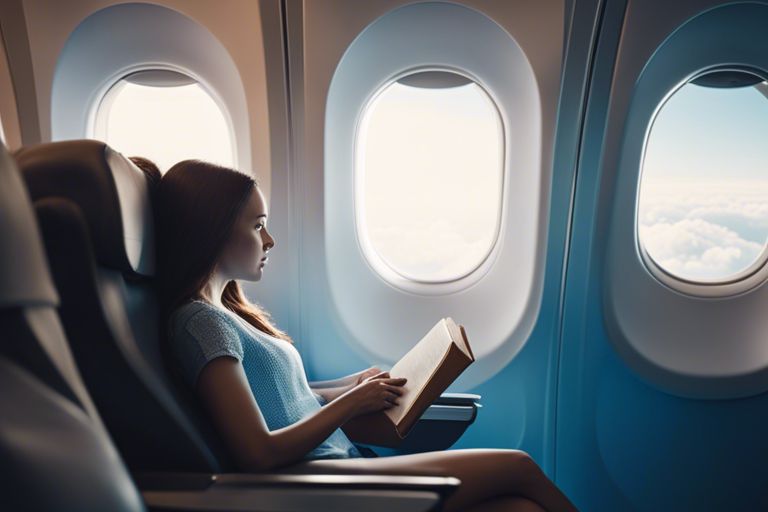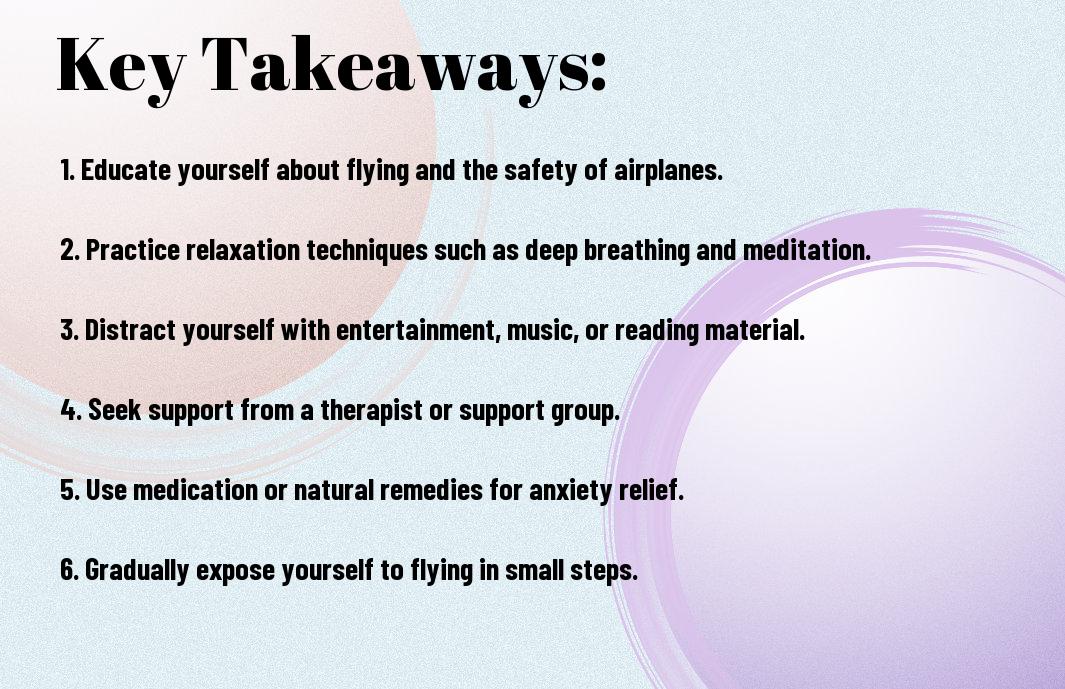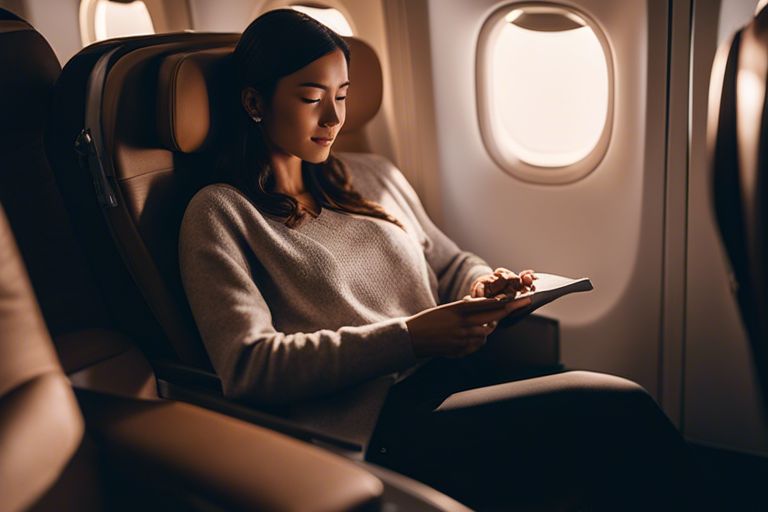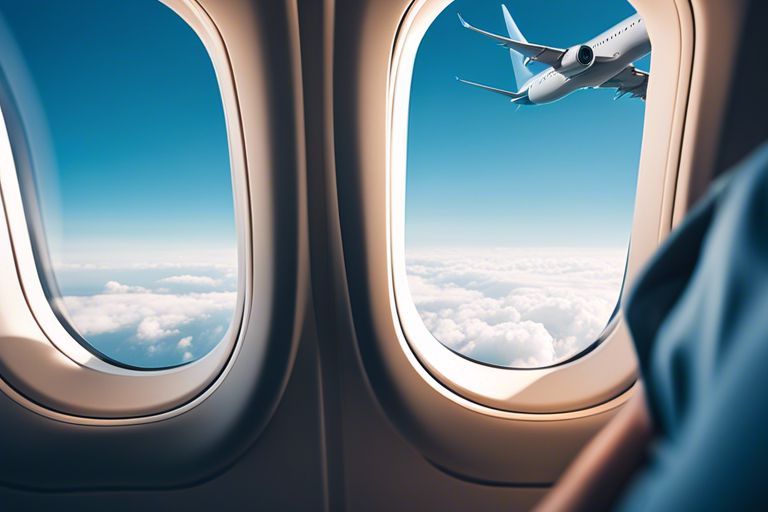Table of Contents
Do you often find yourself experiencing overwhelming anxiety at the thought of flying or traveling? It’s common to feel a sense of dread when it comes to stepping onto a plane, but it doesn’t have to control your life. There are various strategies and techniques you can use to manage and overcome your fear of flying and travel anxiety. In this blog post, we will discuss some effective methods to help you conquer your fears and make your next travel experience more enjoyable.
Key Takeaways:
- Identify triggers: Understanding what specifically causes your travel anxiety or fear of flying can help you develop targeted coping strategies.
- Practice relaxation techniques: Deep breathing, meditation, and visualization can all help calm your mind and body before and during your flight.
- Seek professional help: If your anxiety is impacting your daily life, consider reaching out to a therapist or mental health professional for support and guidance.
- Learn about the flight process: Educating yourself about the safety measures and procedures involved in flying can help alleviate some fears and uncertainties.
- Gradual exposure: Gradually exposing yourself to the triggers of your anxiety, such as airports and planes, can help desensitize you over time.


Identifying Your Travel Anxiety Triggers
Obviously, the first step in handling your travel anxiety is to identify what triggers it. This can be different for everyone, and it’s important to pinpoint what specifically causes your fear of flying or travel anxiety. One way to figure this out is to reflect on past experiences and emotions that have been associated with travel. You can also consider seeking professional help or reading resources like What to Do if You’re Anxious About Flying for additional insights and guidance.
Common Triggers of Travel Anxiety
For many people, the fear of not being in control is a common trigger for travel anxiety. The thought of being confined in a crowded space, the fear of turbulence, or the lack of personal space can all contribute to anxiety. Additionally, concerns about safety and the fear of the unknown can also be triggers for many individuals.
Personal Reflection and Journaling Techniques
One effective way to identify your personal triggers is through personal reflection and journaling. By recording your emotions, thoughts, and physical sensations before, during, and after travel experiences, you can gain valuable insights into what specifically triggers your anxiety. This self-awareness can help you in developing effective coping mechanisms and strategies to manage your travel anxiety.
Preparing for Your Journey
However, before embarking on your trip, it is important to take some time to prepare yourself for the journey ahead. This can help alleviate some of the anxiety and fear you may be feeling about your upcoming travel.
Practical Steps to Reduce Travel Anxiety
One practical step you can take to reduce travel anxiety is to plan and organize your trip well in advance. This can include researching your destination, making a packing list, and booking accommodations and transportation. Knowing what to expect can help you feel more in control and less anxious about the unknown aspects of your journey.
Coping Strategies for Fear of Flying
If you have a fear of flying, there are several coping strategies you can use to help manage your anxiety. Deep breathing exercises, mindfulness, and visualization techniques can help relax your mind and body during the flight. Additionally, you can also consider seeking professional help, such as counseling or therapy, to address and overcome your fear of flying.
During the Trip
To effectively manage your travel anxiety and fear of flying, it is essential to have a plan in place for how you will manage your emotions and stay calm during your trip. This includes both in-flight and during transit. Below are some techniques and tips to help you navigate through your journey with confidence.
Techniques to Manage Anxiety In-Flight
If you experience anxiety during the flight, there are several techniques you can use to manage your emotions. Deep breathing and mindfulness exercises can help to calm your nerves and keep you grounded. You can also try visualizing a peaceful place or engaging in distraction techniques such as listening to music or watching a movie. Additionally, some people find relief through medication or natural remedies, so consult your doctor if this is an option for you.
Staying Calm and Collected During Transit
Transit can be a stressful part of the journey, especially if you are dealing with a fear of flying or travel anxiety. To stay calm and collected, it can be helpful to stay organized and prepared by planning your transit route in advance and allowing extra time for unexpected delays. Engaging in relaxation techniques such as deep breathing or listening to calming music can also help to ease your anxiety. Additionally, try to stay focused on the present moment rather than worrying about the future or what may go wrong. Remember, you have the strength and resilience to handle any challenges that may arise.
Additional Support and Resources
Your journey to overcome travel anxiety and fear of flying may require additional support and resources. This chapter will provide you with valuable information on when to seek professional help, as well as useful tools and apps for anxious travelers.
When to Seek Professional Help
If your travel anxiety is significantly impacting your daily life and preventing you from enjoying travel experiences, it may be time to seek professional help. Symptoms such as panic attacks, extreme fear, and avoidance of travel situations can be signs that you need professional support. A mental health professional can provide you with the necessary tools and therapy to help you manage your anxiety and overcome your fear of flying.
Useful Tools and Apps for Anxious Travelers
As an anxious traveler, having access to useful tools and apps can help alleviate your travel anxiety. There are several apps available that provide relaxation techniques, breathing exercises, and anxiety management strategies specifically designed for travelers. Additionally, digital resources such as guided meditation sessions and anxiety tracking tools can be incredibly beneficial for managing your anxiety during travel.

Conclusion
With these considerations in mind, you now have a better understanding of how to handle travel anxiety and fear of flying. By preparing mentally, practicing relaxation techniques, and seeking professional help if necessary, you can take control of your fears and enjoy the benefits of traveling. Remember that it’s okay to feel anxious, but it’s important to not let fear hold you back from experiencing new places and adventures. With the right tools and support, you can overcome your travel anxiety and fear of flying.
FAQ
Q: What is travel anxiety and fear of flying?
A: Travel anxiety and fear of flying are common psychological conditions that can cause intense feelings of worry, fear, or dread when it comes to traveling by plane. These conditions can make it difficult for individuals to enjoy or even endure the process of flying, and can be triggered by various factors including fear of heights, turbulence, or a lack of control.
Q: How to handle travel anxiety and fear of flying?
A: There are several strategies that can help individuals manage and alleviate their travel anxiety and fear of flying. These can include seeking support from a mental health professional, practicing relaxation techniques such as deep breathing or meditation, and gradually exposing oneself to the feared situation through a process called desensitization. Additionally, cognitive behavioral therapy (CBT) can be effective in identifying and challenging negative thought patterns related to flying and travel.
Q: Can medication help with travel anxiety and fear of flying?
A: In some cases, medication may be prescribed to help individuals manage their travel anxiety and fear of flying. These can include anti-anxiety medications or sedatives that can help calm nerves and reduce the intensity of anxious feelings. However, it’s important to consult with a healthcare professional before starting any medication regimen, as they can provide guidance on the most appropriate options and dosages based on an individual’s specific needs and medical history.

